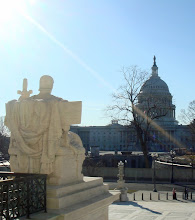Week 48: Impeachment
In this election cycle, a topic
has arisen that had not been among those originally contemplated for this 52
Weeks blog. The topic, of course, is impeachment. Let us begin by grounding
ourselves in the Constitution of the United States of America, which is the foundation
of our social contract with one another, including those citizens chosen for public
office.
·
Article I, Section 2, Clause 5 of the Constitution
gives the House of Representatives the sole power of impeachment.
·
Article I, Section 3, Clause 6 give the Senate
the sole power to try all cases of impeachment. When serving in this function,
Senators are under oath or affirmation. When trying the president, the Chief
Justice of the Supreme Court presides. A concurrence of two-thirds of members
present are required for conviction.
·
Article II, Section 4 lists the offenses for
which a president may be removed from office, which include: treason, bribery
or other high crimes and misdemeanors.
·
Article 1, Section 3, Clause 7 lays out the
punishments for a conviction of treason. They include: removal from office and
the disqualification to hold office. This is the extent of the powers of
Congress. An impeached individual may still be subject to trial and penalty as
a citizen under the law.
In the late eighteenth century,
after the War of Independence was won and after the Articles of Confederacy
were being found insufficient in terms of governing the new nation, the Constitution
was drafted and an effort for ratification was underway. To further explain and
gain support for the new Constitution, Alexander Hamilton, John Jay and James
Madison wrote a series of 85 essays, which are collectively known as The
Federalist Papers.
In Federalist 65,
Hamilton opens in regard to the powers of the Senate, “A well-constituted court
for the trials of impeachments is anb object not more to be desired than
difficult to be obtained in a government wholly elective. The subjects of its
jurisdiction are those offenses which proceed from the misconduct of public
men, or, in other words, from the abuse or violation of some public trust. They
are of a nature which may with peculiar propriety be denominated political,
as they relate chiefly to injuries done immediately to society itself. The prosecution
of them, for this reason, will seldom fail to agitate the passions of the whole
community, and to divide it into parties more or less friendly or inimical to
the accused. In many cases it will connect itself with the pre-existing
factions, and will enlist all their animosities, partialities, influence, and
interest on one side or on the other; and in such cases there will always be
the greatest danger that the decision will be regulated more by the comparative
strength of parties, than by the real demonstrations of innocence or guilt.”
By way of background, and as an
illustration of how times change, the power to try cases of impeachment was vested
in the Senate, as it was, at the time, viewed as “significantly dignified” and “sufficiently
independent.” The Supreme Court was thought to lack the appropriate degree of
credit and authority to try such cases. Additionally, impeachment is predicated
on some political violation, as described above, and not necessarily a violation
of law, for which the Supreme Court was designed to adjudicate.
Providing alternative arguments
during the period of consideration of ratification were writings that have
become, collectively, The Anti-Federalist Papers. Under the nom de plume
Brutus, the issue of high crimes and misdemeanors was mentioned on March 20,
1788. “Treason and bribery are named, and the rest are included under the
general terms of high crimes and misdemeanors. Errors in judgment, or want
of capacity to discharge the duties of the office, can never be supposed to be
included in these words, high crimes and misdemeanors.
With insight from these papers
into the intentions of those who designed the impeachment process, we must weigh
the impending impeachment of Donald Trump from two perspectives.
First, are the accusations against
him ones of errors in judgment or want of capacity to discharge his office? For
clarification, the word capacity, at that time, included concepts that we may
differentiate today as capability. It is ability in a legal, moral or
intellectual sense.
Second, are the accusations
against him born of a dislike for the political philosophy he espouses or the
personal characteristics he embodies.
In The Federalist Papers,
impeachment is described as a “national inquest.” If this inquest proves nothing
more than an error in judgment or exposes no more than an agitation of the
passions, we must, through the lens of principle, disregard his alleged
offenses, if we are to cast votes unprejudiced by the animosity of the president’s
political opponents. However, if he be accused and perhaps condemned of
substantive violations of the public trust, which injure the body politic, we must
let that guide our consciences in casting our votes.
In Federalist 64, Jay writes, as
it relates to corruption in the execution of treaties, “As to corruption, the
case is not supposable. He must either have been very unfortunate in his
intercourse with the world, or possess a heart very susceptible of such
impressions, who can think it probable that the President and two thirds of the
Senate will ever be capable of such unworthy conduct. The idea is too gross and
too invidious to be entertained.” The Founders envisioned persons of good will
to be elected to office and that the will of the people would guide such
elections.
The House of Representatives, our
representatives, hold the power to impeach; the Senate to convict. As citizens,
it is our duty to let our voices be heard by our representatives. Weigh the issue
in the context of the Constitution and informed by the two questions above.
Then, without the subjectivity of passion, tell your representative how to
proceed, consistent with your expectation of him or her.
